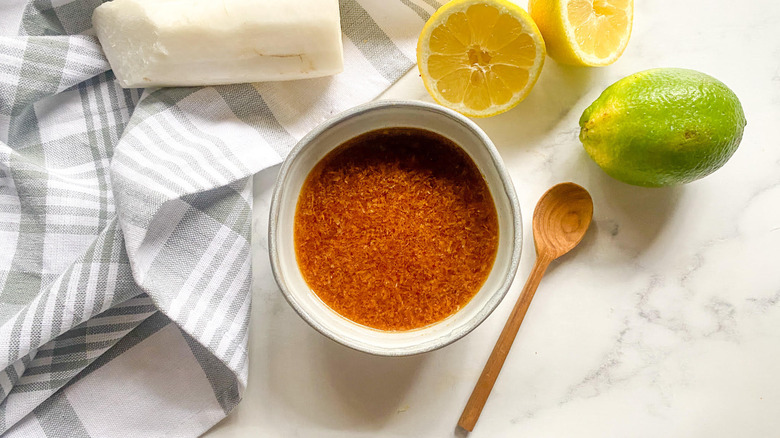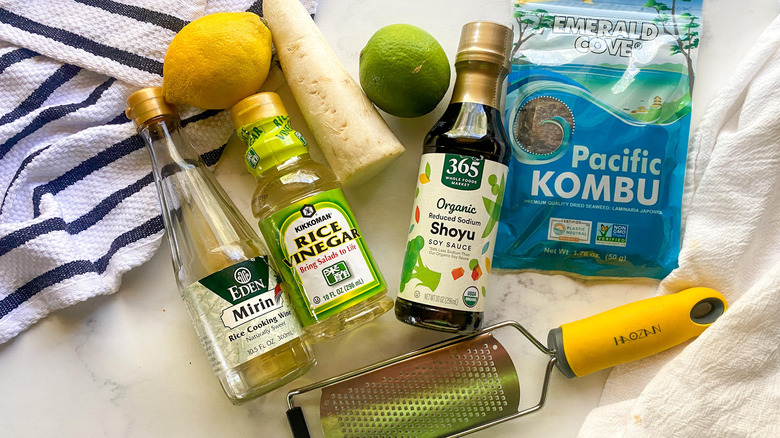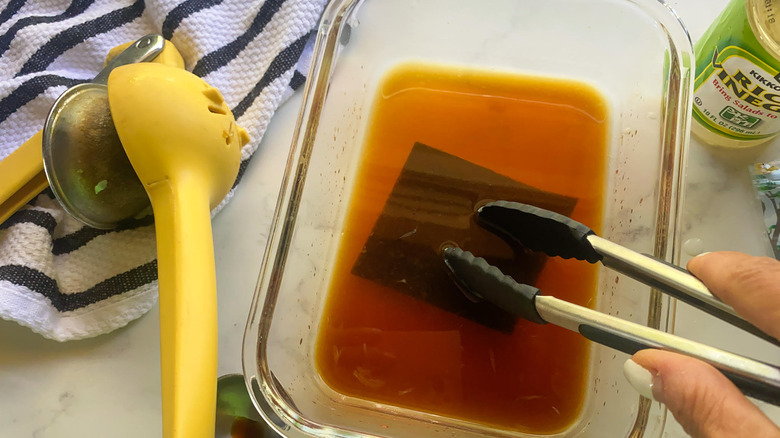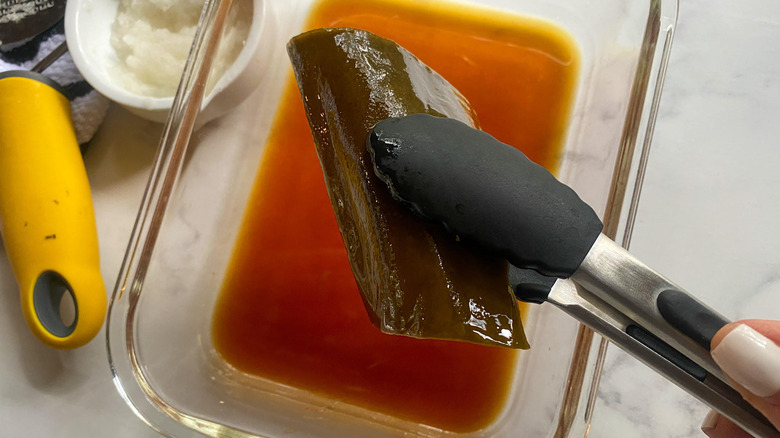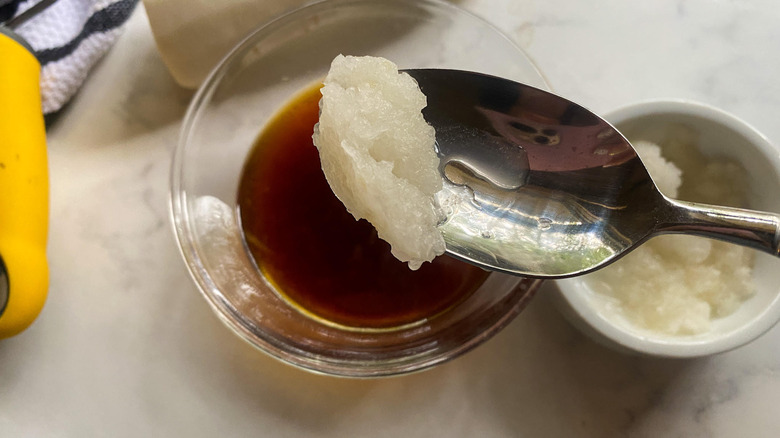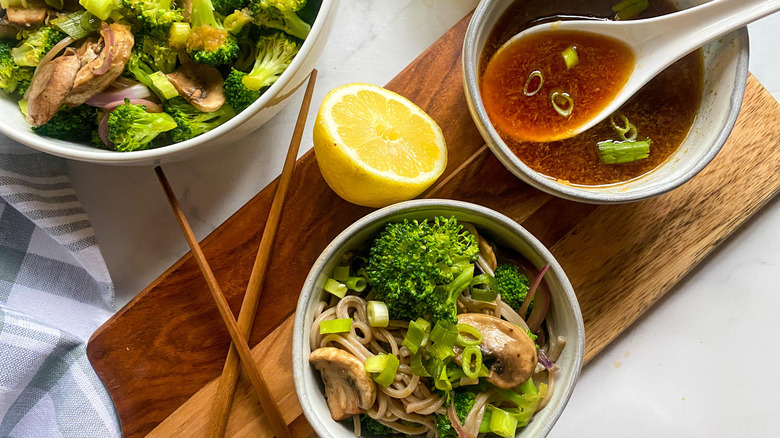Ponzu Sauce With Daikon Recipe
Ponzu sauce is one of the most popular sauces in Japanese cuisine, and there's a good reason for it — it adds a fantastic flavor to pretty much any food that you're eating, and whether you want to dip your potstickers in it or drizzle it over your rice. According to Serious Eats, the origin of Ponzu sauce is murky, but the name is not. The first part, "pon," comes from the Dutch word "punch." On the other hand, the end of the term, "zu," comes from the word "vinegar." Hey, there is a punchy vinegar flavor in this sauce, so the name definitely checks out!
Recipe developer Miriam Hahn created this fantastic ponzu sauce recipe, and it even incorporates daikon into the mix. "I make Asian food super frequently, so I love having a variety of sauces in my back pocket to keep things interesting! This one is bursting with citrus flavor and adds a lot of 'wow' to just about anything," Hahn raves. "I have served this for all types of occasions but mostly with stir fry. I always have a ton of veggies in the house and use this sauce often for that. However, it does make a great dipping sauce for egg rolls or spring rolls." Skip the store-bought stuff and make this homemade version for optimal flavor results.
Gather the ingredients for this ponzu sauce with daikon
Start things off with a trip to the store. You will need Shoyu sauce, fresh lime and lemon juice, rice vinegar, mirin, kombu (which is dried seaweed), a daikon radish, and optionally scallions for topping.
Combine the liquids and kombu
For this step, you will need a flat, shallow container to add a few ingredients to. Go ahead and toss in the lemon juice, Shoyu sauce, lime juice, rice vinegar, mirin, and kombu. Let the liquids and kombu piece sit for a minimum of 3 hours or overnight, if possible. "The secret ingredient is the Shoyu sauce. Similar to soy sauce but a little thinner and sweeter," Hahn shares. "I like the subtle sweetness it adds as a complement to the lime and lemon juice."
Remove the kombu strip
After you let everything sit in the marinade, you can remove the kombu strip from the liquid. It should be pretty soft, which means there's a chance that it will break into little pieces. If this happens, just be sure to remove all of the little pieces from the liquid.
Grate the daikon radish
Using a micro plane, grate the daikon radish finely. Then, you can add it to the mixture.
Serve your homemade ponzu sauce with daikon
Here's the best part — you get to serve the ponzu sauce with daikon to your lucky guests. This sauce is super tasty and can go on several Asian dishes, but Hahn provides her favorite suggestions. "Love it with any sort of rice or noodle dish. Great with any sort of dumpling or wonton....super versatile," Hahn shares.
If you have anything left, don't sweat it! "Leftovers last for a week if kept in a sealed container in the fridge," Hahn says. We hope you enjoy this tasty recipe.
Ponzu Sauce With Daikon Recipe
Learn how to make ponzu with grated daikon, a soy-based sauce that's infused with lots of flavor.
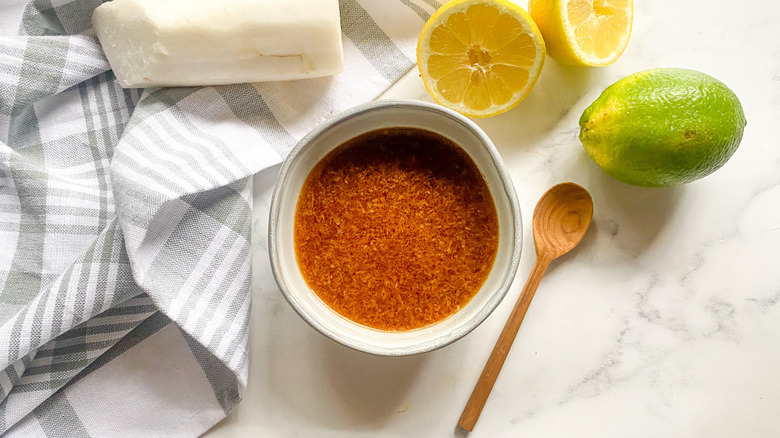
Ingredients
- juice from 1 lemon
- 3 tablespoons Shoyu sauce
- juice from 1 lime
- 2 teaspoons rice vinegar
- 1 teaspoon mirin
- 1 (3-inch) piece kombu
- 2 tablespoons daikon radish, finely grated
Optional Ingredients
- scallions, for topping
Directions
- In a flat, shallow container, combine the lemon juice, Shoyu sauce, lime juice, rice vinegar, and mirin, then add in the kombu piece.
- Let that sit for a minimum of 3 hours, or overnight.
- Remove the kombu strip. It will be soft now. If it breaks apart, make sure to get all pieces. Discard the kombu.
- Grate the daikon radish with a micro plane so that it grates it very fine. Add this to the mixture.
- Stir the sauce, optionally garnish with scallions, and serve with your favorite dish.
